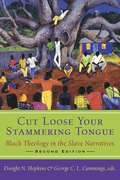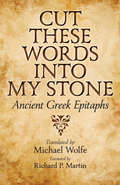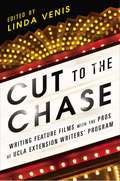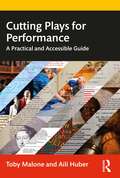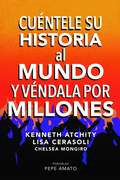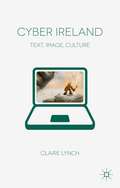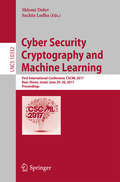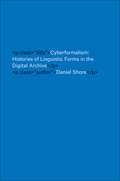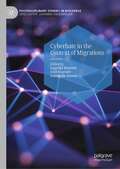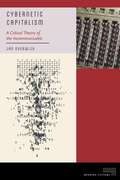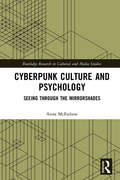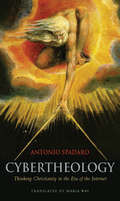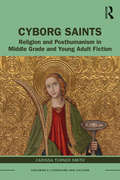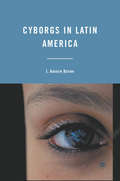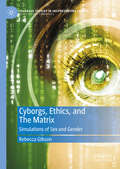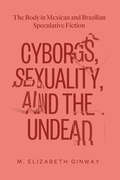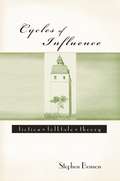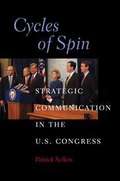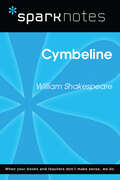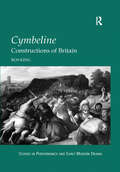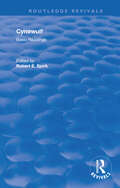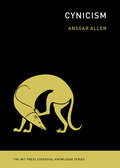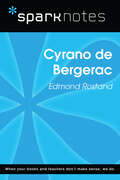- Table View
- List View
Cut Loose Your Stammering Tongue: Black Theology in the Slave Narratives
by Dwight N. Hopkins George C. L. CummingsDrawing on slave narratives found in forty-one volumes of interviews and one hundred autobiographies by former slaves, these contributors explore how enslaved African Americans received the often oppressive faith of their masters but transformed it into a gospel of liberation. This classic work demonstrates how an authentic black theology of liberation today must listen to the divine spirit that once fed and continues to feed the black religious experience. This second edition includes three additional provocative essays.
Cut These Words into My Stone: Ancient Greek Epitaphs
by Michael WolfeThe lively ancient epitaphs in this bilingual collection fit together like small mosaic tiles, forming a vivid portrait of Greek society.Cut These Words into My Stone offers evidence that ancient Greek life was not only celebrated in great heroic epics, but was also commemorated in hundreds of artfully composed verse epitaphs. They have been preserved in anthologies and gleaned from weathered headstones.Three-year-old Archianax, playing near a well,Was drawn down by his own silent reflection.His mother, afraid he had no breath left,Hauled him back up wringing wet. He had a little.He didn't taint the nymphs' deep home.He dozed off in her lap. He's sleeping still.These words, translated from the original Greek by poet and filmmaker Michael Wolfe, mark the passing of a child who died roughly 2,000 years ago. Ancient Greek epitaphs honor the lives, and often describe the deaths, of a rich cross section of Greek society, including people of all ages and classes— paupers, fishermen, tyrants, virgins, drunks, foot soldiers, generals—and some non-people—horses, dolphins, and insects. With brief commentary and notes, this bilingual collection of 127 short, witty, and often tender epigrams spans 1,000 years of the written word. Cut These Words into My Stone provides an engaging introduction to this corner of classical literature that continues to speak eloquently in our time.
Cut to the Chase
by Linda VenisAccomplished writers from the renowned UCLA Extension Writers' Program provide an invaluable how-to book for aspiring feature film writers Millions of people dream of writing a screenplay but don't know how to begin, or are already working on a script but are stuck and need some targeted advice. Or maybe they have a great script, but no clue about how to navigate the choppy waters of show business. Enter Cut to the Chase, written by professional writers who teach in UCLA Extension Writers' Program, whose alumni's many credits include Pirates of the Caribbean: Curse of the Black Pearl; Twilight; and the Academy Award nominated Letters from Iwo Jima. From learning how to identify story ideas that make a good movie to opening career doors and keeping them open, this authoritative, comprehensive, and entertaining book, edited by Writers' Program Director Linda Venis, will be the film-writing bible for decades to come.
Cut/Copy/Paste: Fragments from the History of Bookwork
by Whitney TrettienHow do early modern media underlie today&’s digital creativity? In Cut/Copy/Paste, Whitney Trettien journeys to the fringes of the London print trade to uncover makerspaces and collaboratories where paper media were cut up and reassembled into radical, bespoke publications. Bringing these long-forgotten objects back to life through hand-curated digital resources, Trettien shows how early experimental book hacks speak to the contemporary conditions of digital scholarship and publishing. As a mixed-media artifact itself, Cut/Copy/Paste enacts for readers what Trettien argues: that digital forms have the potential to decenter patriarchal histories of print.From the religious household of Little Gidding—whose biblical concordances and manuscripts exemplify protofeminist media innovation—to the queer poetic assemblages of Edward Benlowes and the fragment albums of former shoemaker John Bagford, Cut/Copy/Paste demonstrates history&’s relevance to our understanding of current media. Tracing the lives and afterlives of amateur &“bookwork,&” Trettien creates a method for identifying and comprehending hybrid objects that resist familiar bibliographic and literary categories. In the process, she bears witness to the deep history of radical publishing with fragments and found materials.With many of Cut/Copy/Paste&’s digital resources left thrillingly open for additions and revisions, this book reimagines our ideas of publication while fostering a spirit of generosity and inclusivity. An open invitation to cut, copy, and paste different histories, it is an inspiration for students of publishing or the digital humanities, as well as anyone interested in the past, present, and future of creativity.
Cutting Plays for Performance: A Practical and Accessible Guide
by Toby Malone Aili HuberCutting Plays for Performance offers a practical guide for cutting a wide variety of classical and modern plays. This essential text offers insight into the various reasons for cutting, methods to serve different purposes (time, audience, story), and suggests ways of communicating cuts to a production team. Dealing with every aspect of the editing process, it covers structural issues, such as plot beats, rhetorical concepts, and legal considerations, why and when to cut, how to cut with a particular goal in mind such as time constraints, audience and storytelling, and ways of communicating cuts to a production team. A set of practical worksheets to assist with the planning and execution of cuts, as well as step-by-step examples of the process from beginning to end in particular plays help to round out the full range of skills and techniques that are required when approaching this key theatre-making task. This is the first systematic guide for those who need to cut play texts. Directors, dramaturgs, and teachers at every level from students to seasoned professionals will find this an indispensable tool throughout their careers.
Cuéntele su Historia al Mundo y Véndala por Millones
by Kenneth Atchity Lisa CerasoliCuéntele su Historia al Mundo y Véndala por Millones, es un libro infaltable tanto para escritores como para guionistas. Posee todo aquello que no le dicen a uno mientras cursa una carrera relacionada con la creación literaria. Pero no solamente son los meros datos de usos y costumbres de los mercados editoriales, también de los nuevos mercados y las posibilidades de una edición electrónica sin pasar por las casas editoriales. ¡Ni hablar de hacer que su historia esté "en forma" para la soñada posibilidad de que su libro se convierta en una película! Este libro lo ayudará efictivamente a contar su historia al mundo, y lo ayudará a venderla por millones!!!
Cyber Ireland
by Claire LynchCyber Ireland explores, for the first time, the presence and significance of cyberculture in Irish literature. Bringing together such varied themes as Celtic mythology in video games, Joycean hypertexts and virtual reality Irish tourism, the book introduces a new strand of Irish studies for the twenty-first century.
Cyber Security Cryptography and Machine Learning: First International Conference, CSCML 2017, Beer-Sheva, Israel, June 29-30, 2017, Proceedings (Lecture Notes in Computer Science #10332)
by Shlomi Dolev Sachin LodhaThis book constitutes the proceedings of the first International Symposium on Cyber Security Cryptography and Machine Learning, held in Beer-Sheva, Israel, in June 2017. The 17 full and 4 short papers presented include cyber security; secure software development methodologies, formal methods semantics and verification of secure systems; fault tolerance, reliability, availability of distributed secure systems; game-theoretic approaches to secure computing; automatic recovery of self-stabilizing and self-organizing systems; communication, authentication and identification security; cyber security for mobile and Internet of things; cyber security of corporations; security and privacy for cloud, edge and fog computing; cryptography; cryptographic implementation analysis and construction; secure multi-party computation; privacy-enhancing technologies and anonymity; post-quantum cryptography and security; machine learning and big data; anomaly detection and malware identification; business intelligence and security; digital forensics; digital rights management; trust management and reputation systems; information retrieval, risk analysis, DoS.
Cyberformalism: Histories of Linguistic Forms in the Digital Archive
by Daniel ShoreA groundbreaking study of how abstract linguistic signs circulate in literature, intellectual history, and popular culture.Linguistic forms are essential to meaning: like words, they make a semantic contribution to the things we say. We inherit them from past writers and speakers and fill them with different words to produce novel utterances. They shape us and the ways we interpret the world. Yet prevalent assumptions about language and the constraints of print-finding tools have kept linguistic forms and their histories hidden from view. Drawing on recent work in cognitive and construction grammar along with tools and methods developed by corpus and computational linguists, Daniel Shore’s Cyberformalism represents a new way forward for digital humanities scholars seeking to understand the textual past. Championing a qualitative approach to digital archives, Shore uses the abstract pattern-matching capacities of search engines to explore precisely those combinatory aspects of language—word order, syntax, categorization—discarded by the "bag of words" quantitative methods that are dominant in the digital humanities. While scholars across the humanities have long explored the histories of words and phrases, Shore argues that increasingly sophisticated search tools coupled with growing full-text digital archives make it newly possible to study the histories of linguistic forms. In so doing, Shore challenges a range of received metanarratives and complicates some of the most basic concepts of literary study. Touching on canonical works by Shakespeare, Milton, Wordsworth, and Kant, even as it takes the full diversity of digitized texts as its purview, Cyberformalism asks scholars of literature, history, and culture to revise nothing less than their understanding of the linguistic sign.
Cyberhate in the Context of Migrations (Postdisciplinary Studies in Discourse)
by Angeliki Monnier Axel Boursier Annabelle SeoaneThis edited book takes an interdisciplinary approach to shed light on the complex dynamics involved in the incidence of online hate speech against migrants in user-generated contexts. The authors draw on case studies from Finland, France, Germany, Italy, Poland and the UK, bringing together qualitative and quantitative analyses on user-generated online comments. The authors argue that online hate speech against migrants must be understood as a symptom of a representation crisis on migration, which can only be fully perceived through the study of the complex linguistic, interactional and connective processes within which it emerges. They focus on representations and shared meanings, community building and otherness, and delve into the role of network ecosystems in the process of the construction of public problems. This book will be of interest to undergraduate and post-graduate students as well as academics working on hate speech and migration studies in a variety of fields, and can also contribute to improving research protocols for automated analyses and detections of online hate speech.
Cybernetic Capitalism: A Critical Theory of the Incommunicable (Meaning Systems)
by Jan OverwijkA Conceptual Interrogation of Capital in a Cybernetic Environment Cybernetic Capitalism presents a groundbreaking synthesis of Niklas Luhmann's systems theory and critical theory. Overwijk examines how neoliberal capitalism now thrives on the management of incommunicability rather than the pursuit of total communicability, harnessing ecological complexity as its driving force. Contrary to earlier critiques that highlighted capitalism's push to render all social life fully communicable, the current era encourages market incalculability, profits from user unpredictability, and spurs serviceworkers' creativity.This ecological logic resonates with the extractivist drive of the Anthropocene, reframing our understanding of capitalism as an adaptive, environment-attuned system. Cybernetic Capitalism also exposes how these dynamics intersect with the cultural rise of conspiracy theories and radical-right irrationalism. By illuminating capitalism's paradoxical reliance on both rationalist and irrationalist currents, Overwijk provides a vital new lens for interpreting the complex politics of our time.
Cyberpunk Culture and Psychology: Seeing through the Mirrorshades (Routledge Research in Cultural and Media Studies)
by Anna McFarlaneThis book traces developments in cyberpunk culture through a close engagement with the novels of the ‘godfather of cyberpunk’, William Gibson. Connecting his relational model of ‘gestalt’ psychology and imagery with that of the posthuman networked identities found in cyberpunk, the author draws out relations with key cultural moments of the last 40 years: postmodernism, posthumanism, 9/11, and the Anthropocene. By identifying cyberpunk ways of seeing with cyberpunk ways of being, the author shows how a visual style is crucial to cyberpunk on a philosophical level, as well as on an aesthetic level. Tracing a trajectory over Gibson’s work that brings him from an emphasis on the visual that elevates the human over posthuman entities to a perspective based on touch, a truly posthuman understanding of humans as networked with their environments, she argues for connections between the visual and the posthuman that have not been explored elsewhere, and that have implications for future work in posthumanism and the arts. Proposing an innovative model of reading through gestalt psychology, this book will be of key importance to scholars and students in the medical humanities, posthumanism, literary and cultural studies, dystopian and utopian studies, and psychology.
Cybersemiotics
by Soren BrierA growing field of inquiry, biosemiotics is a theory of cognition and communication that unites the living and the cultural world. What is missing from this theory, however, is the unification of the information and computational realms of the non-living natural and technical world. Cybersemiotics provides such a framework.By integrating cybernetic information theory into the unique semiotic framework of C.S. Peirce, Søren Brier attempts to find a unified conceptual framework that encompasses the complex area of information, cognition, and communication science. This integration is performed through Niklas Luhmann's autopoietic systems theory of social communication. The link between cybernetics and semiotics is, further, an ethological and evolutionary theory of embodiment combined with Lakoff and Johnson's 'philosophy in the flesh.' This demands the development of a transdisciplinary philosophy of knowledge as much common sense as it is cultured in the humanities and the sciences. Such an epistemological and ontological framework is also developed in this volume.Cybersemiotics not only builds a bridge between science and culture, it provides a framework that encompasses them both. The cybersemiotic framework offers a platform for a new level of global dialogue between knowledge systems, including a view of science that does not compete with religion but offers the possibility for mutual and fruitful exchange.
Cybertheology: Thinking Christianity in the Era of the Internet
by Antonio Spadaro S.J.Because the Internet has changed and is changing the ways in which we think and act, it must also be changing the ways in which we think Christianity and its theology. Cybertheology is the first book to explore this process from a Catholic point of view. Drawing on the theoretical work of authors such as Marshall McLuhan, Peter Levy, and Teilhard de Chardin, it questions how technologies redefine not only the ways in which we do things but also our being and therefore the way we perceive reality, the world, others, and God. “Does the digital revolution affect faith in any sense?” Spadaro asks. His answer is an emphatic Yes. But how, then, are we to live well in the age of the Internet?Spadaro delves deeply into various dimensions of the impact of the Net on the Church and its organization, on our understanding of revelation, grace, liturgy, the sacraments, and other classical theological themes. He rightly points out that the digital environment is not merely an external instrument that facilitates human communication or a purely virtual world, but part of the daily experience of many people, a new “anthropological space” that is reshaping the way we think, know, and express ourselves. Naturally, this calls for a new understanding of faith so that it makes sense to people who live and work in the digital media environment. In developing the notion of cybertheology, Spadaro seeks to propose an intelligence of faith (intellectus fidei) in the era of the Internet.The book’s chapters include reflections on man the decoder and the search engines of God, networked existence and the mystical body, hacker ethics and Christian vision, sacraments and “virtual presence,” and the theological challenges of collective intelligence.
Cyborg Saints: Religion and Posthumanism in Middle Grade and Young Adult Fiction (Children's Literature and Culture)
by Carissa Turner SmithSaints are currently undergoing a resurrection in middle grade and young adult fiction, as recent prominent novels by Socorro Acioli, Julie Berry, Adam Gidwitz, Rachel Hartman, Merrie Haskell, Gene Luen Yang, and others demonstrate. Cyborg Saints: Religion and Posthumanism in Middle Grade and Young Adult Fiction makes the radical claim that these holy medieval figures are actually the new cyborgs in that they dethrone the autonomous subject of humanist modernity. While young people navigate political and personal forces, as well as technologies, that threaten to fragment and thingify them, saints show that agency is still possible outside of the humanist construct of subjectivity. The saints of these neomedievalist novels, through living a life vulnerable to the other, attain a distributed agency that accomplishes miracles through bodies and places and things (relics, icons, pilgrimage sites, and ultimately the hagiographic text and its reader) spread across time. Cyborg Saints analyzes MG and YA fiction through the triple lens of posthumanism, neomedievalism, and postsecularism. Cyborg Saints charts new ground in joining religion and posthumanism to represent the creativity and diversity of young people’s fiction.
Cyborgs in Latin America
by J. Andrew BrownA PDF version of this book is available for free in open access via the OAPEN Library platform, www. oapen. org . Cyborgs in Latin America explores the ways cultural expression in Latin America has grappled with the changing relationships between technology and human identity.
Cyborgs, Ethics, and The Matrix: Simulations of Sex and Gender (Palgrave Studies in (Re)Presenting Gender)
by Rebecca GibsonThe Matrix (Lana Wachowski and Lilly Wachowski 1999) has permeated our cultural consciousness for two decades, working its way into such common parlance as “a glitch in the Matrix,” and the idea of taking the Red Pill. With the release of the fourth movie, The Matrix Resurrections (Lana Wachowski 2021), and the confirmation of the franchise being a metaphor for gender transition, this book examines how the entire franchise contributes to the discourse on sex and gender, and how it has been instrumental in propelling the creation of new types of cyborg technology. This book centers on the main philosophical theme of The Matrix, know thyself, and relate it to the quest for authenticity which creates our identities—be they human, or human “enough”—as we move through the world.
Cyborgs, Sexuality, and the Undead: The Body in Mexican and Brazilian Speculative Fiction
by M. Elizabeth GinwayWriters in Brazil and Mexico discovered early on that speculative fiction provides an ideal platform for addressing the complex issues of modernity, yet the study of speculative fictions rarely strays from the United States and England. Cyborgs, Sexuality, and the Undead expands the traditional purview of speculative fiction in all its incarnations (science fiction, fantasy, horror) beyond the traditional Anglo-American context to focus on work produced in Mexico and Brazil across a historical overview from 1870 to the present. The book portrays the effects—and ravages—of modernity in these two nations, addressing its technological, cultural, and social consequences and their implications for the human body. In Cyborgs, Sexuality, and the Undead, M. Elizabeth Ginway examines all these issues from a number of theoretical perspectives, most importantly through the lens of Bolívar Echeverría&’s &“baroque ethos,&” which emphasizes the strategies that subaltern populations may adopt in order to survive and prosper in the face of massive historical and structural disadvantages. Foucault&’s concept of biopolitics is developed in discussion with Roberto Esposito&’s concept of immunity and Giorgio Agamben&’s distinction between &“political life&” and &“bare life.&” This book will be of interest to scholars of speculative fiction, as well as Mexicanists and Brazilianists in history, literary studies, and critical theory.
Cycles of Influence: Fiction, Folktale, Theory
by Stephen BensonIn this wide-ranging and insightful analysis, Stephen Benson proposes a poetics of narrative for postmodernism by placing new emphasis on the folktale. Postmodernist fictions have evidenced a return to narrative--to storytelling centered on a sequence of events, rather than a "spiraling" of events as found in modernism--and recent theorists have described narrative as a "central instance of the human mind." By characterizing the folktale as a prime embodiment of narrative, Benson relates folktales to many of the theoretical concerns of postmodernism and provides new insights into the works of major writers who have used this genre, which includes the subgenre of the fairy tale, in opening narrative up to new possibilities. Benson begins by examining the key features of folktales: their emphasis on a chain of events rather than description or consciousness, their emphasis on a self-contained fictional environment rather than realism, the presence of a storyteller as a self-confessed fabricator, their oral and communal status, and their ever-changing state, which defies authoritative versions. He traces the interactions between the folktale and Italo Calvino's Fiabe Italiane, between selected fictions of John Barth and the Arabian Nights, between the work of Robert Coover and the subgenre of the fairy tale, and between the "Bluebeard" stories and recent feminist retellings by Angela Carter and Margaret Atwood. The arguments presented will interest not only folklorists and scholars of narrative but also readers in fields ranging from comparative literature to feminist theory.
Cycles of Spin: Strategic Communication in the U. S Congress
by Patrick SellersHow do politicians try to shape their news coverage? Sellers examines strategic communication campaigns in the U.S. Congress. He argues that these campaigns create cycles of spin: leaders create messages, rank-and-file legislators decide whether to promote those messages, journalists decide whether to cover the messages, and any coverage feeds back to influence the policy process. These four stages are closely related; decisions at one stage influence those at another. Sellers uses diverse evidence, from participant observation and press secretary interviews, to computerized content analysis and vector auto regression. The result is a comprehensive and unprecedented examination of politicians' promotional campaigns and journalists' coverage of those campaigns. Countering numerous critics of spin, Sellers offers the provocative argument that the promotional messages have their origins in the actual policy preferences of members of Congress. The campaigns to promote these messages thus can help the public learn about policy debates in Congress.
Cymbeline (SparkNotes Literature Guide Series)
by SparkNotesCymbeline (SparkNotes Literature Guide) by William Shakespeare Making the reading experience fun! Created by Harvard students for students everywhere, SparkNotes is a new breed of study guide: smarter, better, faster.Geared to what today's students need to know, SparkNotes provides:chapter-by-chapter analysis explanations of key themes, motifs, and symbols a review quiz and essay topics Lively and accessible, these guides are perfect for late-night studying and writing papers.
Cymbeline: Constructions of Britain (Studies in Performance and Early Modern Drama)
by Ros KingIn Cymbeline: Constructions of Britain, Ros King argues that because of previous misunderstanding of the nature and history of tragi-comedy, critics have mistaken the tone of Shakespeare's play. Although it is often dismissed as a pedestrian 'romance', or at best a self-parodic reworking of previous Shakespearean themes, she proposes that Cymbeline's fantastical, black comedy and its facility for keeping multiple plots all in the air together are in fact a tour de force of dramaturgical construction. King's multi-faceted approach combines strikingly perceptive commentaries on the text's most notoriously difficult passages, with descriptions of performance, and analysis of the text's historical, cultural and literary contexts. In this wide-ranging study, the play becomes a focus for considering early modern England's encounters with its Scottish king, with religious struggle in Europe, and with the indigenous peoples of North America. King demonstrates that the play's dramaturgical structure enables it to raise daring questions about the nature of government, the rights of birth and of succession, and the concepts of 'empire', supplying a curiously bitter and indeed tragic undercurrent to the final 'happy' ending while attempting to neutralise contemporary religious conflict. Having explored the influences that went into the writing of Cymbeline, King devotes her final chapter to the play's later reception and shows how it has been made to respond to different cultural pressures over time. Using as a test case the outrageously ebullient production at Shakespeare Santa Cruz, 2000, for which she was dramaturg, she outlines an ethic for interpretation and considers the problems to be faced in both criticism and performance when realising the text as living theatre for a modern audience.
Cynewulf: Basic Readings (Basic Readings In Anglo-saxon England Ser.)
by Robert E. BjorkTwo original essays and 16 published since 1950 offer a comprehensive view of Cynewulf, his language, and his poetry. The collection contains important new statements on dates, provenance, and canon by R.D. Fulk and Patrick W. Conner, four influential essays that thoroughly explore Cynewulf's runic signature and poetic style, and major contributions to our understanding of the four signed poems of Cynewulf, Fates of the Apostles, Christ II, Juliana, and Elene. Three essays are devoted to each of these poems, and the essays themselves exemplify a broad range of approaches to this highly elusive Anglo-Saxon poet. The volume complements existing book-length treatments of the subject and will be welcome to scholars and students who need the foundations of Cynewulf scholarship at their fingertips.
Cynicism (The MIT Press Essential Knowledge Series)
by Ansgar AllenA short history of cynicism, from the fearless speech of the ancient Greeks to the jaded negativity of the present. Everyone's a cynic, yet few will admit it. Today's cynics excuse themselves half-heartedly—“I hate to be a cynic, but..."—before making their pronouncements. Narrowly opportunistic, always on the take, contemporary cynicism has nothing positive to contribute. The Cynicism of the ancient Greeks, however, was very different. This Cynicism was a marginal philosophy practiced by a small band of eccentrics. Bold and shameless, it was committed to transforming the values on which civilization depends. In this volume of the MIT Press Essential Knowledge series, Ansgar Allen charts the long history of cynicism, from the “fearless speech” of Greek Cynics in the fourth century BCE to the contemporary cynic's lack of social and political convictions.Allen describes ancient Cynicism as an improvised philosophy and a way of life disposed to scandalize contemporaries, subjecting their cultural commitments to derision. He chronicles the subsequent “purification” of Cynicism by the Stoics; Renaissance and Enlightenment appropriations of Cynicism, drawing on the writings of Shakespeare, Rabelais, Rousseau, de Sade, and others; and the transition from Cynicism (the philosophy) to cynicism (the modern attitude), exploring contemporary cynicism from the perspectives of its leftist, liberal, and conservative critics. Finally, he considers the possibility of a radical cynicism that admits and affirms the danger it poses to contemporary society.
Cyrano de Bergerac (SparkNotes Literature Guide Series)
by SparkNotesCyrano de Bergerac (SparkNotes Literature Guide) by Edmond Rostand Making the reading experience fun! Created by Harvard students for students everywhere, SparkNotes is a new breed of study guide: smarter, better, faster.Geared to what today's students need to know, SparkNotes provides:chapter-by-chapter analysis explanations of key themes, motifs, and symbols a review quiz and essay topics Lively and accessible, these guides are perfect for late-night studying and writing papers.
